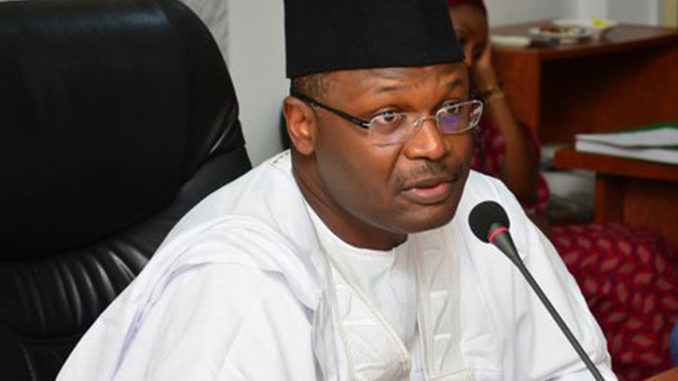
THE Independent National Electoral Commission has reminded political parties and aspirants for various elective offices to always adhere to guidelines prescribed by law in conducting primaries for the selection of candidates for elections. High-level indifference to this critical attribute of party democracy in the last general election bequeathed 806 pre-election cases to the electoral umpire, most of which have yet to be resolved.
As a result, INEC has withdrawn the certificates of return of 64 candidates it had earlier declared winners after the courts had voided their elections and the rightful winners declared by the courts. Among the beneficiaries is the newly sworn in Governor Bello Matawalle of Zamfara State, the flagbearer of the Peoples Democratic Party. INEC Chairman, Mahmood Yakubu, who gave these details, at a ceremony where Matawalle was given his certificate of return, in line with a Supreme Court judgement, decried the huge cost the litigation imposed on all the parties affected in these cases. The 806 cases, INEC says, are double the number of election petitions at the various election tribunals across the country.
The PDP candidate scored 189,452 votes compared to the 534,542 votes secured by Mukhtar Idris of the All Progressives Congress. Therefore, the PDP never challenged the poll’s outcome. It was simply a case of dog eat dog for the APC. Two factions, one controlled by the immediate former governor, Abdullaziz Yari, and the other by Kabir Marafa, a senator, had struggled for the leadership of the party. The imposition of candidates and rejection of such impunity bred irreconcilable differences in the party, which led to a raft of litigation from the state High Court up to the Supreme Court. The APC never fielded candidates as a consequence of not conducting legitimate primaries, the court ruled. But Matawalle is not alone in this harvest of political fortunes: three senatorial, seven House of Representatives and 24 state assembly seats, were all ceded to the PDP.
A legal hammer such as this is a fitting response to the high-level of intra-party feuding, indiscipline and recklessness which have characterised political party organisations at all levels since 1999. Earlier in February, the Rivers State chapter of the APC had been barred by the Supreme Court from participating in the 2019 elections for the same reason. Rival factions led by two key political actors battled each other for control of the party machinery so that the primaries might produce candidates of their choice. As neither of them succeeded, the battle shifted to the courts. It was so bizarre that on the day a Port Harcourt High Court was to deliver its ruling in the case, thugs allegedly belonging to these factions invaded the premises and engaged each other for over 30 minutes in an exchange of gunfire. Lawyers and court officials scampered for safety. This is a dangerous drift in our democracy.
Taming this tidal wave of disorder and disregard for due process is imperative now. Yakubu says that henceforth, INEC “… will not accept the submission of names of candidates by political parties under Section 31 of the Electoral Act 2010, unless there is evidence, monitored by the commission, of compliance with the provision of Section 87 of the Act.” It had stuck to its guns on the Zamfara APC debacle — not to accept its candidates for the election — until a state High Court ordered it to reverse its decision.
Indeed, the Zamfara and Rivers APC misfortunes are quite unique. What had prevailed before now were pockets of illegal substitutions of candidates across a broad spectrum of parties at every election, fuelled primarily by vested interests, corruption or unbridled monetisation of the electoral process. It also played out in the last polls. For instance, one of those INEC withdrew certificates of return from was a former aide to President Muhammadu Buhari in one of the North-West states, who resigned to vie for the primaries. He had lost his bid for a senatorial ticket, but got the backing of the party hierarchy for him to supplant the candidate who had won the Reps ticket.
Nigeria is vainly practising democracy without democrats; and under such a milieu, the system will merely trudge, and will not deliver the expected results: rapid socio-economic development and respect for the rule of law. Since the country has signed on to democracy, the best form of government known to man, its values or ethos should be imbibed without compromise. The courts have a critical role to play in this regard, which it has commendably done in the Zamfara and Rivers states saga; and in the 64 withdrawn certificates of return.
But court sanctions by nullifying the outcome of elections cannot be the only remedy in a matter where corruption is involved. Illegal substitution of candidates will continue to bedevil our democratic process until the beneficiaries and party hierarchies that traffic in them are visited with appropriate sanctions. Therefore, deliberate steps should be taken by the Federal Government to implement the recommendations of the Muhammadu Uwais panel report on the establishment of a separate body to handle electoral offences. It will help to deepen our democratic culture.
The United States and the United Kingdom’s democracies that serve as models to other nations of the world never evolved by aiding those who corrupt their systems through criminal aloofness in taking legal actions against them. They whipped errant politicians into line; Nigeria must do so too, if her warped political culture should change.
END

Be the first to comment